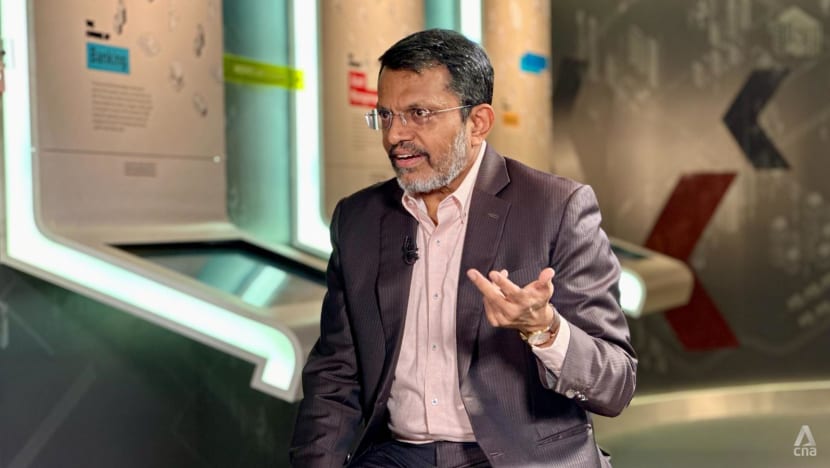Inflation in Singapore has eased but MAS 'not declaring victory yet': Central bank chief
In an interview with CNA, outgoing MAS chief Ravi Menon also explains why he does not foresee a global recession in 2024.

Mr Ravi Menon, managing director of the Monetary Authority of Singapore, in an interview with CNA ahead of the annual Singapore FinTech Festival from Nov 15 to 17. (Photo: CNA/Jeremy Long)

This audio is generated by an AI tool.
- Core inflation is in “a much better place” but still remains above past average of around 2 per cent, says MAS managing director Ravi Menon
- It would be “premature” to shift to a looser monetary policy stance
- Global economic outlook clouded by a host of uncertainties, such as high interest rates and a China slowdown, but a global recession is unlikely
SINGAPORE: The Monetary Authority of Singapore (MAS) is “not declaring victory” in its fight against inflation just yet, even as price pressures in Singapore have come off multi-year highs.
It is also “premature” to talk about a loosening in monetary policy, said Mr Ravi Menon, who is retiring as central bank chief in January.
After a steady ascend to multi-year highs last year, consumer prices in Singapore have eased over the course of this year.
Headline inflation stood at 4.1 per cent in September, versus the peak of 7.5 per cent last September. Core Inflation – which excludes accommodation and private transport and is a key indicator for the MAS – also slowed from the 14-year high of 5.5 per cent at the start of 2023 to 3 per cent in September.
The latter is set to dip below 3 per cent in the final months of the year, in line with the central bank’s earlier forecast, said Mr Menon in a wide-ranging interview with CNA ahead of the annual Singapore FinTech Festival from Nov 15 to 17.
Even then, the battle against elevated price pressures brought on by a confluence of global events, such as supply chain bottlenecks and an energy crisis, is not over.
“We are not declaring victory yet,” Mr Menon told CNA, adding that 3 per cent “is not good enough” given how core inflation has typically averaged around 2 per cent.
The next one-percentage point increase in the Goods and Services Tax (GST) scheduled for next January will also have “an immediate impact” on inflation, he noted.
MAS has projected a core inflation rate of 2.5 to 3.5 per cent for 2024 after taking into account the GST hike. Without which, core inflation will be one percentage point lower at 1.5 to 2.5 per cent.
“Core inflation is in a much better place than in the last two years but we’re not home yet. So, I think it would be premature to talk about relaxation or easing in monetary policy,” said Mr Menon.
To rein in inflation, MAS tightened monetary policy five times in 12 months, including two off-cycle moves in January and July 2022. This year, the central bank has opted to stand pat at both its monetary policy meetings.
Mr Menon noted that MAS’ decision to take a pause from policy tightening mirrors that of other central banks.
“It’s too early to ease because once you ease and if inflation surges up again, you’ve got to redo all that hard work,” he told CNA. “Central banks are right to be conservative on this and to wait.”
Global central banks have been “fortunate” in that the rapid rate hikes taken to tame inflation have not resulted in “too high a cost in economic growth”.
“Growth has slowed down, but not as drastically as some of us thought might have been the case,” he said.
Moving into 2024, the MAS chief reckoned that global growth is likely to be “fairly weak … but still staying above water”.
Lately, some economists have sounded concerns about the war between Israel and Hamas possibly tipping the world into recession. Asked for his assessment, Mr Menon said it is “hard to tell” as the conflict is in a “very early stage”.
He noted that one of the key risks of geopolitical conflicts is the impact on global energy and key commodity prices. The Ukraine war, for one, had “very far-reaching price effects across a range of resources” given how both Russia and Ukraine are major commodity producers and exporters.
“I’m less sure of this conflict, unless there's a widening of the conflict, in which case, there will be some of those spillovers,” said Mr Menon. “It's far too early to say.”

For now, the key downside risks to the global economy continue to be a possible resurgence in inflation resulting in higher-for-longer interest rates in the advanced economies, a worse-than-expected slowdown in China’s economy and disruptions in specific industries such as electronics.
But overall, he does not expect a global recession next year.
“Do I see it on the cards? Not quite, because as I said, I think the slowdown has been gradual,” said Mr Menon.
“I thought there would have been a recession early this year. I was proven wrong because the economies turned out to be a lot more resilient, especially the labour markets, in the face of high interest rates.”
Worries of negative spillover effects on emerging economies – in the form of large capital outflows due to a stronger US dollar – also did not materialise. The flurry of bank failures at the start of the year did not result in broader contagion effects, largely thanks to global regulatory reforms that have increased the resilience of banks, he added.
“So, not to be too optimistic, but I don’t think there is ground for exceptional pessimism.”
Back home, the Singapore economy went through “a pretty bad patch” in recent quarters, in line with the slowdown in global growth, Mr Menon said.
Growth began to hit the brakes in the third quarter of last year and while the local economy averted a recession, growth slowed to near stagnant in the second quarter of 2023.
Advance estimates for the third quarter suggest that the economy may have bottomed out, he said.
The Singapore economy grew 0.7 per cent year-on-year during the July to September period, an uptick from the 0.5 per cent growth in the previous quarter, according to flash data released by the Ministry of Trade and Industry earlier this month.
On a quarter-on-quarter seasonally adjusted basis, gross domestic product expanded by 1 per cent, much faster than the marginal 0.1 per cent growth in the preceding quarter.
In its most recent monetary policy statement on Oct 13, MAS said Singapore’s full-year growth for 2023 is likely to come in “at the lower half” of the official growth forecast range of 0.5 to 1.5 per cent due to “muted” growth prospects in the near term.
Moving into 2024, growth “should improve gradually” in the second half of the year, it added.
Additional reporting by Elizabeth Neo

















